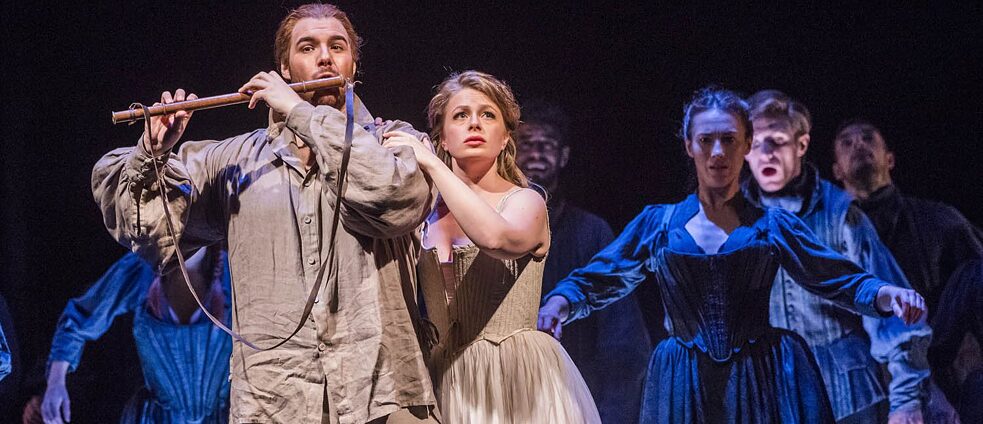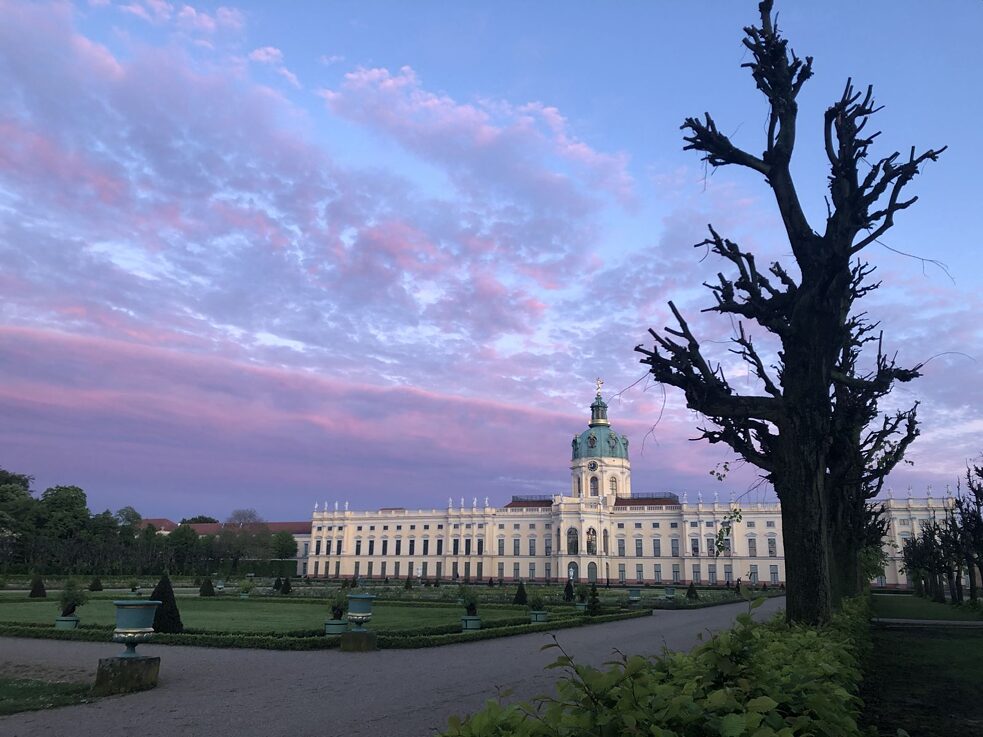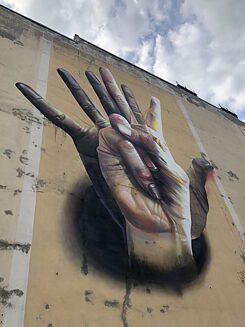Guest blogger Siobhan
The essence of us all

Celebrated Australian soprano Siobhan Stagg was in Sydney for concerts when the global shutdowns began. She flew home to Berlin and watched her calendar of performances crumble like dominoes before her eyes. The silver lining? She’s learned to unplug and discovered the theatrical talents of Mother Nature.
By Siobhan Stagg
Do yourself a favour. Open a YouTube browser, search Furie terribili and allow yourself to enjoy two minutes of musical fireworks. In my LBC — my “Life before Corona” — this shot of energy was my daily bread. I travelled the world singing in some of the finest concert halls, with brilliant colleagues and endless poetry and music to explore. Italian adjectives like legato and staccato peppered my speech as if it were the most natural thing in the world. People cried, applauded and threw flowers in gratitude for bringing music into their lives.
Suddenly coronavirus entered stage left, and all public gatherings were cancelled for the foreseeable future. The tagline ‘non-essential’ was abruptly stamped across the entire arts sector, raising tricky existential questions for thousands of arts workers. If what we do is not essential to society, where does that leave us?
 Singing with a spoon: My "All by Myself" parody project
| © Siobhan Stagg
Artists rapidly poured out online quarantine content, eager to stay visible amidst the torrent of cancelled performances. Alongside videos from the Deutsche Oper Berlin and the Royal Opera House, my output included a cover of Eva Cassidy’s Songbird as a tribute to frontline workers and a lockdown parody of All By Myself, using a tablespoon as microphone. Likes, comments and shares abounded. They buoyed my spirits for a few moments, but ultimately I still felt empty and alone.
Singing with a spoon: My "All by Myself" parody project
| © Siobhan Stagg
Artists rapidly poured out online quarantine content, eager to stay visible amidst the torrent of cancelled performances. Alongside videos from the Deutsche Oper Berlin and the Royal Opera House, my output included a cover of Eva Cassidy’s Songbird as a tribute to frontline workers and a lockdown parody of All By Myself, using a tablespoon as microphone. Likes, comments and shares abounded. They buoyed my spirits for a few moments, but ultimately I still felt empty and alone.
Good Vibrations
You see, experiencing music in the presence of others is the real source of magic. Whichever side of the podium you sit, there’s nothing like being vibrated to your core by the power of Mahler’s Resurrection Symphony — with a 200-voiced choir, 100+ musicians in the orchestra and 2000 people in the hall — all focusing on exactly the same cadence at exactly the same moment in time. It’s a paradox of intense intimacy, magnified by its public communion. Such moments may not be strictly necessary for survival, but they are essential; they are filled with essence.
With Berlin’s three opera houses closed, the sky above my balcony has become the most beautiful theatre. Without needing to buy a ticket, she puts on a different show, night after night. It’s a pity it took a global pandemic for me to notice her talents… how she spins characters in the clouds, darker hued when clutching buckets of impending rain, the ensuing rainbow smiles, strutting out her exquisite colour palette at sundown.
A dusk walk through Schlosspark Charlottenburg has become my daily meditation. Phones are left on the kitchen table — no buzzing distractions are allowed during this rare respite from the constant screen time. I suppose the lake has always been this beautiful but I’d scarcely noticed the intensity of colour until now, the scented blossoms, the ducklings becoming awkward teenagers. In LBC there had always been a timeline to scroll, an urgent text to answer, a nagging voicemail. Technology felt so enticing until it was all we had. Now the novelty is in the analogue.
 Sunset at Schloss Charlottenburg in Berlin
| © Siobhan Stagg
Sunset at Schloss Charlottenburg in Berlin
| © Siobhan Stagg
PS. I (still) love you ...
Gazing out from the steps at Schlosspark Charlottenburg, it occurs to me that this scene has elements of theatre, too. With the lake as plateau, the sidelining trees are the theatre’s curtains. Centre stage, the ducks give a sprightly audition, chasing and scooting along the water’s edge. Without fanfare the protagonist arrives: the swan. The slightest lift of her wings and she doubles in size and majesty. “I’m here,” she emanates. “I will distract you from your cares.” Behind us the onlookers ooh and ahh. A black labrador performs pirouettes around its owner, intertwining its lead with another dog’s in a spontaneous pas-de-deux.
As an expat who was drawn to Berlin for its vibrant cultural offerings, I’ve learned to love this city in new ways through lockdown. There’s still a lot to love and I hope we’ll see audiences flocking back to theatres and concert halls as soon as it’s safe to do so.
 Peace street art in Berlin
| © Siobhan Stagg
In the meantime, I’m noticing art wherever I go. Yesterday, I found myself in old East Berlin at Treptower Park, contemplating the enormity of the Soviet War Memorial. A brigade of tall poplar trees surrounds the site, planted in an arched curve and saluting the sky. Within its arc, a row of weeping willows mirrors the aspect of a sculpted soldier kneeling in respect to his fallen comrades. This layout of trees is completely artistic, yet executed so subtly that most visitors don’t give it a second thought. On our bike ride home, we pass several dazzling examples of street art amidst otherwise grungy surrounds, like this set of scalloped hands, one dark and one fair, cascading in a gesture of peace. The energy of this image outshines the unsightly used car yard it calls gallery and home.
Peace street art in Berlin
| © Siobhan Stagg
In the meantime, I’m noticing art wherever I go. Yesterday, I found myself in old East Berlin at Treptower Park, contemplating the enormity of the Soviet War Memorial. A brigade of tall poplar trees surrounds the site, planted in an arched curve and saluting the sky. Within its arc, a row of weeping willows mirrors the aspect of a sculpted soldier kneeling in respect to his fallen comrades. This layout of trees is completely artistic, yet executed so subtly that most visitors don’t give it a second thought. On our bike ride home, we pass several dazzling examples of street art amidst otherwise grungy surrounds, like this set of scalloped hands, one dark and one fair, cascading in a gesture of peace. The energy of this image outshines the unsightly used car yard it calls gallery and home.I suppose the biggest compliment to art is that so much of it passes us by, unnoticed and without accolade. Art is everywhere: in our Netflix addictions, our Spotify playlists, on our box of breakfast cereal and in a modest piece of sky. Those who don’t recognise the value of art must simply not have learned to see it yet.
The more I think about it, the more I’m convinced. Art is not only essential; it’s the essence of us all.